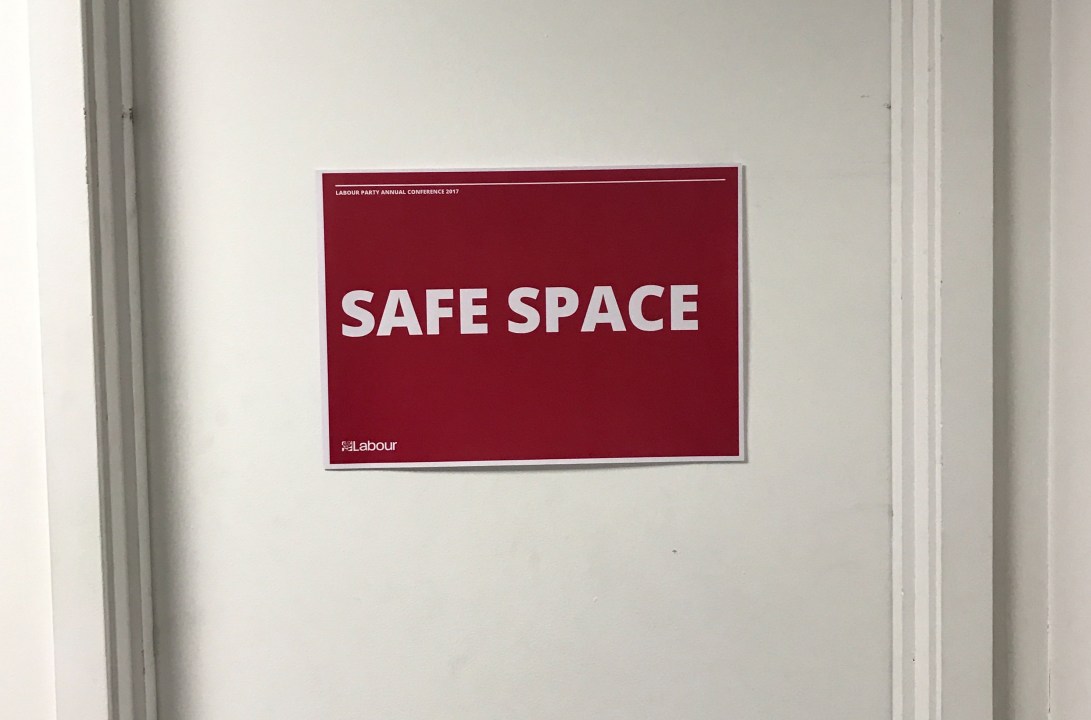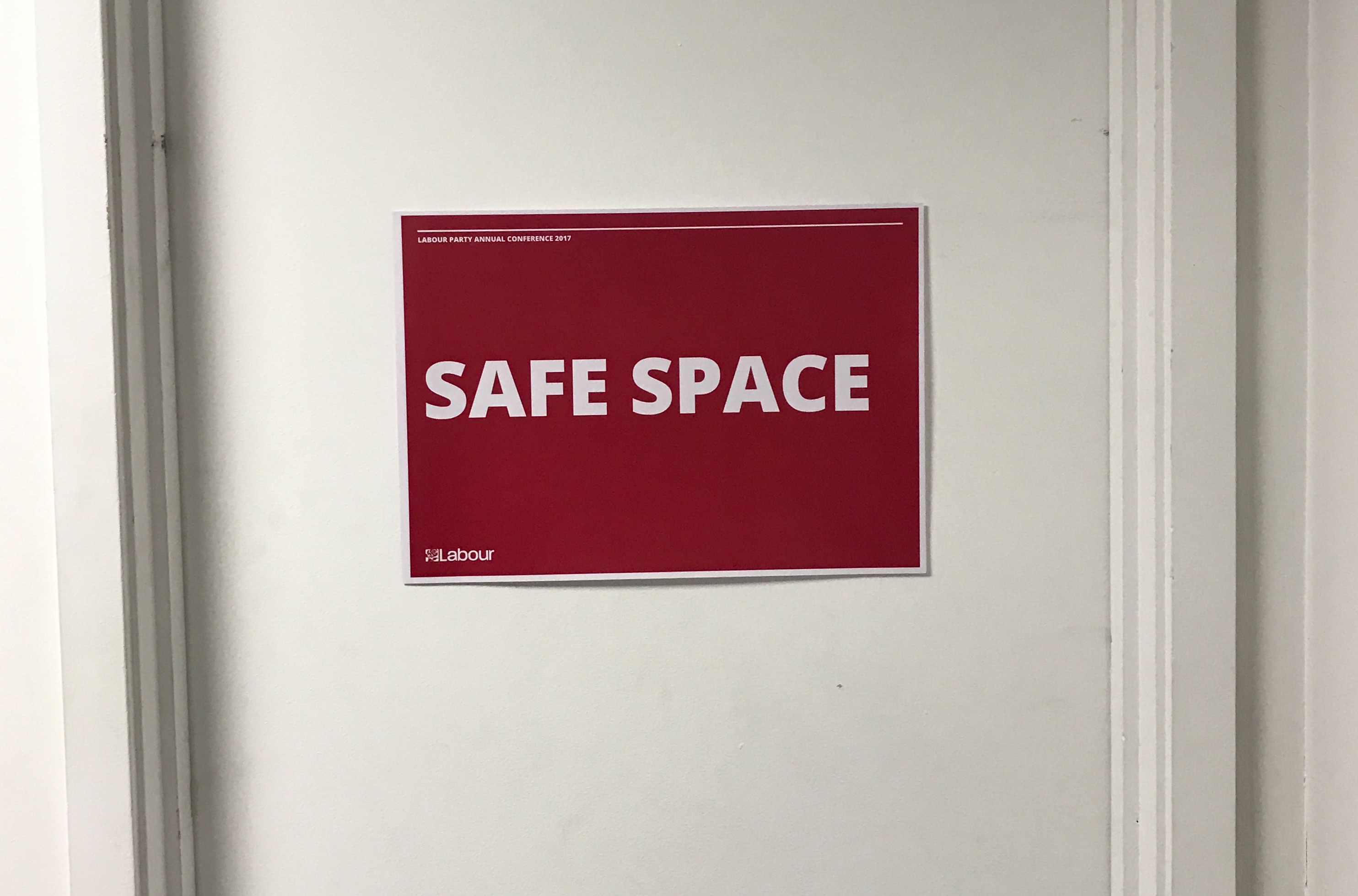Oh, how wonderfully hilarious: Labour conference has a safe space. It’s exactly what you’d expect from a Party now led by eccentric former rebel backbenchers who’d probably still rather be making jam in peace in Islington, isn’t it?
I ventured into the room marked ‘safe space’ in the Brighton Centre this week, half expecting to find a group of Blairites huddled in one corner and a group of members who just couldn’t cope with the idea of a debate on continuing single market membership in the other. Disappointingly, it was just a bare room with a few chairs and an odd hatstand which seemed to be brandishing a bin.

The truth is that the room wasn’t set up as a refuge for people horrified to discover that even in the Labour Party there are people who disagree with them on how to solve poverty and stop wars. It’s rather less hilarious than that: events often offer quiet rooms for people with autism, for instance, who find big crowds making many noises totally unbearable. Or people who suffer from panic attacks and would like to take a couple of minutes to compose themselves in a place a little more salubrious than a toilet. Not quite so hilarious; in fact, more a feature of a society whose inhabitants generally try to live together well, in the same way as some workplaces have breastfeeding rooms and airports have multifaith prayer rooms. These rooms aren’t for everyone, but they’re a kind thing to include for those who need them.
The problem is that ‘safe spaces’ have become about the opposite to living together kindly, and that’s why they are treated with such derision. They have moved from a therapeutic context into the public realm, with university buildings and other spaces previously used for open debate being deemed ‘safe spaces’ from ideas which might challenge or provoke could upset people just far too much, or ‘trigger’ them. The problem is that these ‘unsafe’ ideas tend to be ones which aren’t of a mainstream sort: someone arguing for stricter limits on abortion, for instance. So safe spaces become a form of censorship of certain arguments. And this ultimately harms those who don’t believe in stricter abortion limits because they don’t have the chance of arguing elegantly about why their opponent is wrong, and in doing so persuading more people to agree with them.
These arguments have been well-rehearsed. But another harmful effect of the ‘safe space’ and ‘trigger warning’ phenomenon is the effect it has on those it was originally designed to help. These terms come from a well-meaning desire to help those who are struggling to recover from trauma and need a therapeutic ‘safe space’ in order to do so.
To make this personal for a few lines, I have had to use a ‘safe space’ myself in the past year, joining a support group for people who were trying to deal with a trauma which had led to them suffering from post-traumatic stress disorder. Feeling safe in the room where we talked about Extremely Bad Things which had happened to us was pretty important, as you’d expect. It’s not fun stuff. But the reason we needed a ‘safe space’ was not in order to wallow in misery. It was so that we could cope with the rest of the world: my PTSD meant I lost a year of my sanity and months of work time and I was quite keen to regain both. The problem was that I couldn’t do so without confronting some Extremely Bad Things, because the extremely irritating thing about PTSD is that it keeps reminding you of the Extremely Bad Things in the most prosaic of settings. If you’re a war veteran, the sound of a car exhaust backfiring might send you right back to the roadside explosive device which went off beside you.
A desire to protect people from having to relive their Extremely Bad Traumas was what led to ‘trigger warnings’ on graphic descriptions of rape or violence against women, for instance, but the problem is that PTSD is a little more devious than that. You can’t have a trigger warning for car exhausts. Or indeed, to return to a personal example, a trigger warning on the automatic doors of the supermarket where I had my most recent hideous and inconvenient flashback as a result of something I’d seen which took me straight back in an indescribably physical and emotional way to an Extremely Bad Thing. I’d rather not avoid supermarkets for my entire life, so I need to work out how to deal with the flashback, not the trigger. The kindest thing to do when it comes to people fighting this really very annoying mental illness is to help them reach a stage where they can cope with remembering certain Bad Things. That’s generally best left to the professionals, but society can help by generally being kind, which society generally is.
But society grows irritated when perfectly well-meaning attempts to help people who’ve had a miserable time are then hijacked by those who just don’t want to hear views they disagree with. None of the people in my support group had pitched up because they’d read a book which challenged their views on moral issues, or because they’d heard a delegate at Labour conference arguing something that they didn’t like. Debate isn’t traumatic. It can be challenging, and infuriating too, especially if you are arguing with someone dogmatic who refuses to concede a point. But it also leads to the exposure and deconstruction of useless views. Possibly a bit upsetting if you happen to be the person whose useless views just lost out, but not traumatic.
Safe spaces are now the stuff of mockery, and those trying to recover from genuine trauma so they can go through life quite peacefully are lumped in with those who claim to be ‘triggered’ by stuff they merely disagree with. As those who are actually ‘triggered’ by certain things know, avoiding those things just makes life miserable and awkward: it’s far better to confront them, possibly even in a ‘safe space’ with some professionals. Avoiding the world or avoiding people you disagree with just isn’t a good way to live. Promoting ‘safe spaces’ from debate isn’t the kindly move that it might seem. But whoever set up the ‘safe space’ at Labour conference clearly was thinking kindly of their fellow delegates. It just might have been safer to call it a ‘quiet room’, just so that the people who really needed it didn’t feel objects of total derision.








Comments